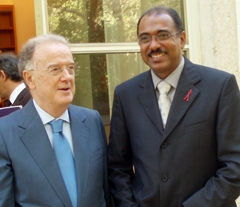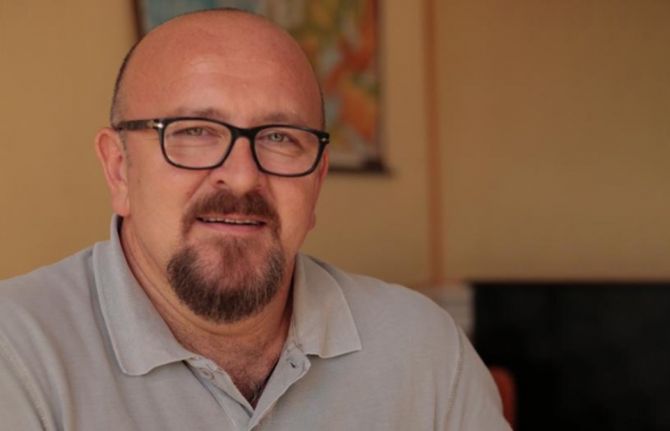
Feature Story
European meeting discusses migration, TB and HIV
15 octobre 2007
15 octobre 2007 15 octobre 2007
UNAIDS Deputy Director Michel Sidibe with former
President of Portugal and United Nations Special
Envoy to the Stop TB Programme, Jorge Sampaio.
Migration, mobile populations and tuberculosis were priority focus areas at the meeting of EU national AIDS Coordinators, organized by the Portuguese Presidency of the European Union. UNAIDS Deputy Director Michel Sidibe stressed that increased action in these areas is vital in the goal of universal access to HIV prevention, treatment, care and support.
“European governments have a big part to play in making universal access a reality,” said UNAIDS Deputy Director, Michel Sidibe. Underlining commitments on AIDS made by the EU member states, he urged governments to “provide leadership and funding at home and abroad [with] a special duty to support neighbours in Eastern Europe and North Africa.”
Held as part of the events organized during the Portuguese Presidency of the EU, participants included representatives from EU Member States and neighbouring countries.
With increased labour migration, or the movement of people across borders in the region, the issue of AIDS specific issues and responses concerning migrants and mobile populations in Europe was high on the meeting agenda.
Numerous factors related to migration, including socio-economic and cultural factors as well as government processes and the conditions in destination countries, impact on HIV risk and the rights of migrants living with HIV.
“AIDS spreads as economies boom - as people move from rural to urban areas, from country to country, in search of a better life,” said UNAIDS Deputy Executive Director Michel Sidibe, underlining that movement across borders introduces HIV risk as people spending long periods of time away from home are more likely to engage in casual sex, may be placed in situations which make them vulnerable to HIV and often find themselves living on the margins of society, where they cannot access the HIV prevention and treatment services they need.
“This is made worse when there is no consistency between States regarding access to HIV services. In some countries undocumented migrants can access services – provided they know where to go. In others they can’t. In some, they have to pay at point of service delivery; at others they don’t. This is not universal access!” Sidibe said, noting that UNAIDS, the International Labour Organization and the International Organization of Migration are currently drafting a policy on HIV and migration which is expected for release shortly.
Focus on migrant workers within the AIDS response is key, he underlined, “for humanitarian and human rights reasons. For public health reasons and for socio-economic reasons: if migrants are healthy, they can make an active contribution to economic growth.”
Sidibe noted Portugal’s response to the issue of HIV and migration as an example of best practice that should be built on across the EU. “Portugal has blazed a brave trail in two key areas - introducing harm reduction programmes for injecting drug users and providing HIV services to migrants – documented and undocumented,” he said.
Tuberculosis and the interaction between TB and HIV epidemics in the region was also a key focus area for the EU meeting. The development and spread of multi-drug resistant and extensively drug resistant tuberculosis, especially among people living with HIV, was underlined as a serious concern for Europe and Africa, and one that threatens the achievement of universal access and the millennium development goals.
Underlining the need for a joint response to TB and HIV in the region and worldwide, the UNAIDS Deputy Executive Director met with former Portuguese President and UN Special Envoy to the Stop TB Partnership, Jorge Sampaio. At the meeting, Sidibe stressed UNAIDS commitment to advocating for a joint response on TB and HIV and encouraged Special Envoy Sampaio to continue his important work on these key health issues.
During his intervention in Lisbon, the UNAIDS Deputy Executive Director also met with the Portuguese Minister of Health, Mr Correia de Campos, Secretary of State for European Affairs, Mr Manuel Lobo Antunes and with the Executive Secretary of the Community of Portuguese-speaking Countries, Ambassador Luís de Matos Monteiro da Fonseca. In all meetings, Sidibe underlined the importance of the next European Union - Africa Summit and that it will be crucial to have AIDS on the agenda.
“We must lead by example and assure universal access to HIV prevention, treatment, care and support within this region by 2010,” said Sidibe.
Links:
Read more on migration



